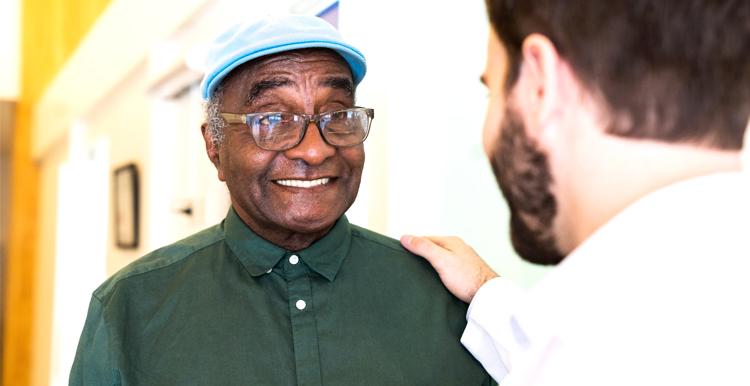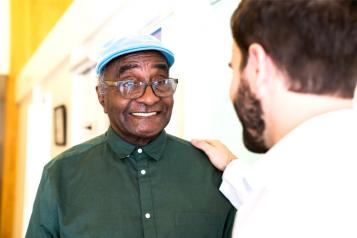Government accepts recommendations of Leng report on physician associates

The government has accepted in full the findings of the Leng Review published earlier this week.
Healthwatch England sat on the review’s advisory stakeholder group, sharing evidence from their work last year on the issue, and Healthwatch Haringey attended a roundtable between local Healthwatch and the review’s chair, Professor Gillian Leng. Healthwatch Haringey Board Member David Winskill, contributed to the session. See his comments below.
The Leng Review looked into the role of physician associates (PA), covering recruitment and training, scope of practice, supervision, and regulation. David talked about the need for physician associates and patients to have a shared understanding of the role and what can only be done by a GP. He also raised concerns about the practicalities of supervision of the PA role in surgeries and issues about continuity of care.
Findings of the review
The review acknowledged key patient concerns about:
- Lack of clarity about the role, including identification and confusion with a doctor.
- Barriers to care, for example if a prescription was required.
- Lack of confidence in whether they were seeing an appropriate medical professional
The review also involved surveys of physician and anaesthetist associates and wider teams that work with them, roundtables with health professionals and an extensive literature review.
Key recommendations
- The role of physician associate should be renamed as ‘physician assistant’, ‘reflecting the role as a supportive, complementary member of the medical team’.
- Physician assistants should not see undifferentiated patients except within clearly defined national clinical protocols. The review said this was particularly significant in primary care or the emergency department, where patients first present with new symptoms and the risk of missing a serious or unusual condition was the highest.
- Newly qualified physician assistants should gain at least two years’ experience in secondary care before being allowed to work in primary care or a mental health trust.
- Assistants should wear a national uniform, lanyards and badges to distinguish them from doctors.
- A named doctor should take overall responsibility for each physician assistant as their formal line manager.
- Assistants should have career progression opportunities to become advanced assistants.
What happens now?
NHS England has written to all trusts, practices and Integrated Care Boards to tell them to immediate use the new titles of physician or anaesthesia assistants. This change will be formalised in forthcoming legislation.
Currently employed assistants can remain in post, but their deployment should be adjusted if necessary to meet the recommendations, especially around not seeing undifferentiated patients. New assistants should only be employed in primary care if they have first worked in secondary care.
The Royal College of GPs is considering whether it will retain its current opposition to PAs being used in general practice, whilst the British Medical Association said the review didn’t go far enough because it did not recommended a nationally set scope of practice.
Healthwatch Haringey opinion
David Winskill, Board Member Healthwatch Haringey said:
For several years Healthwatch Haringey and the Haringey PPG Network has been concerned about the continuing and expanding use of physician associates in our practices. Our attention was heightened following the desperately sad death of Emily Chesterton nearly three years ago.
As you will see from the summary of recommendations, the review has looked at aspects of the recruitment, training, employment, supervision and practice of PAs and anaesthetic associates. Most people who have been following the debate will agree that the recommendations are welcome and, credit to the Secretary of State for Health, the NHS has been instructed to adopt all of them immediately.
However, one major demand has gone unanswered - a nationally adopted scope of practice. Some will argue that to have introduced one would limit the flexibility that surgeries can develop in how they employ PAs. Others feel that the lack of a scope leads to service user confusion and makes local supervision much more difficult. As I prepared to give evidence, Healthwatch Haringey shared a document with me about the number of new roles that have appeared in North Central London GP surgeries over the past few years.
Apart from PAs, the list included care co-ordinators, pharmacy technicians, enhanced practice nurses, health and wellbeing coaches – there are now 23 roles that barely existed a decade ago and, for many people, they are little more than a jumble of words.
The mistakes that the NHS has made over PAs must not be duplicated with other new roles: patients and carers must have a clear understanding of the competencies and roles of the staff who are looking after them, clear lines of accountability and continuity of care, and transparency in how they are introduced and supervised.
There is a crucial role for Healthwatch all over the country to establish a constructive dialogue with practices and NHS Integrated Care Boards to help achieve openness, patient safety, understanding and acceptance of the roles.
Haringey Patient Participation Group (PPG) Network and communications in North Central London
Last year Healthwatch Haringey worked with the Haringey PPG Network to seek clarification on PA roles.
The PPG Network meeting in June 2024, facilitated by Healthwatch Haringey, recommended actions for helping patients understand the scope of practice of PAs, how they introduce themselves and how to complain.
The PPG Network asked North Central London Integrated Care Board (NCL ICB) to add a PA specific webpage to its website setting out a description of the PA job role, limits of competency, patient choice and how to complain. The Network also recommended distribution of a patient leaflet which made it clear that PAs are not doctors.
Following the announcement of the government's Leng review, the ICB paused the production of local leaflets. However, they have included a summary of the PA role on their "Your Local Health Team" pages which, along with information on other Primary Care roles, is being shared with practices as part of a communications toolkit.
The text includes the phrase "Physician associates are not doctors":
Physician associates
Physician associates are clinically trained healthcare professionals who play a supportive role in your local health team. Physician associates are not doctors and must work under the supervision of a named GP. Physician associates can take your medical history, plan your treatment, request and analyse test results and give you advice about your health and wellbeing.


